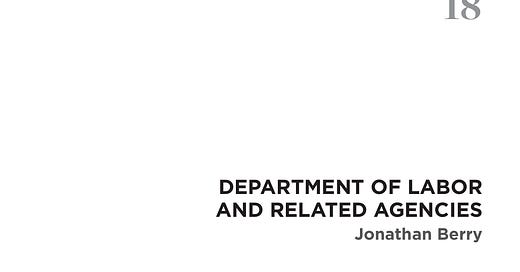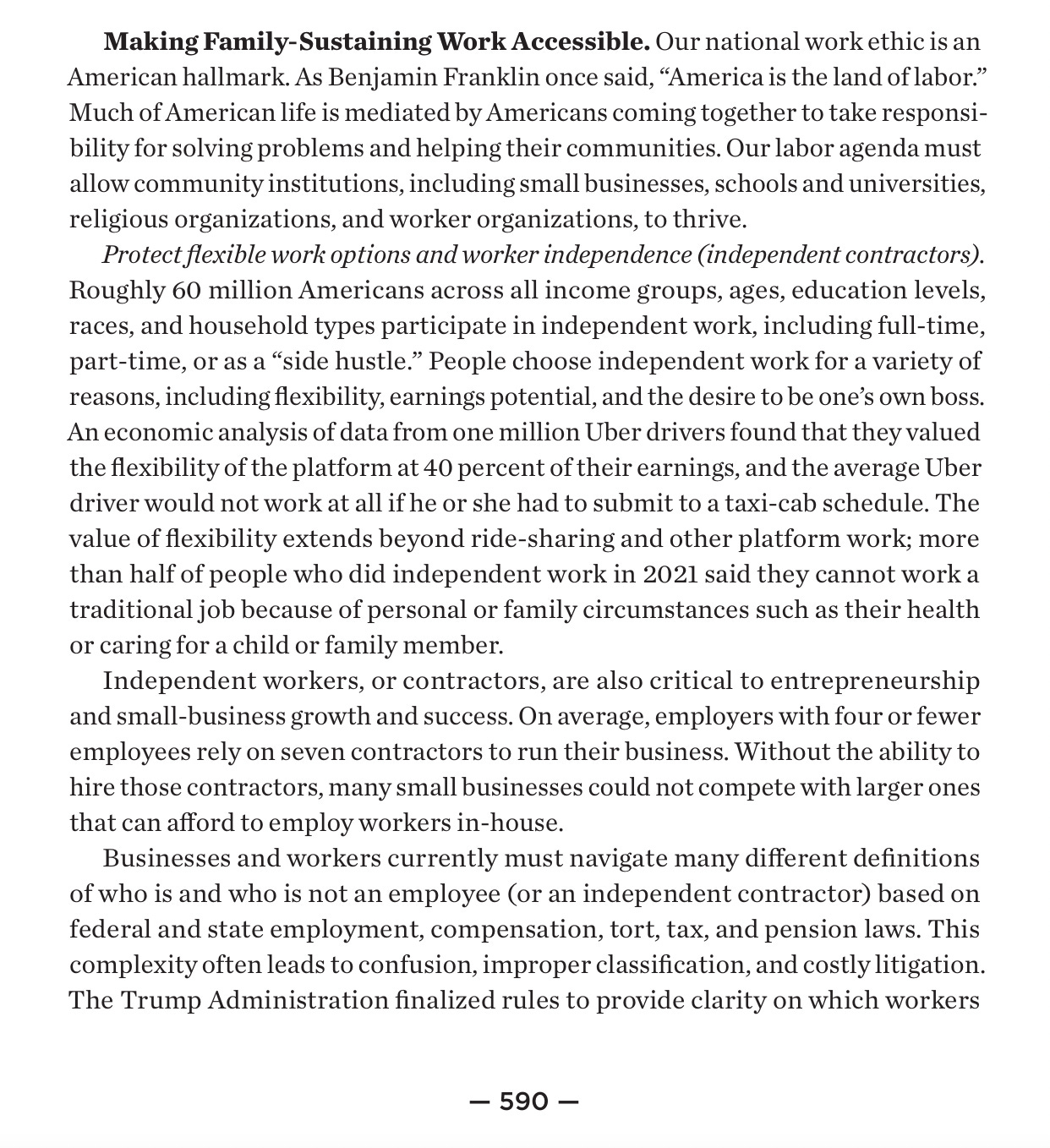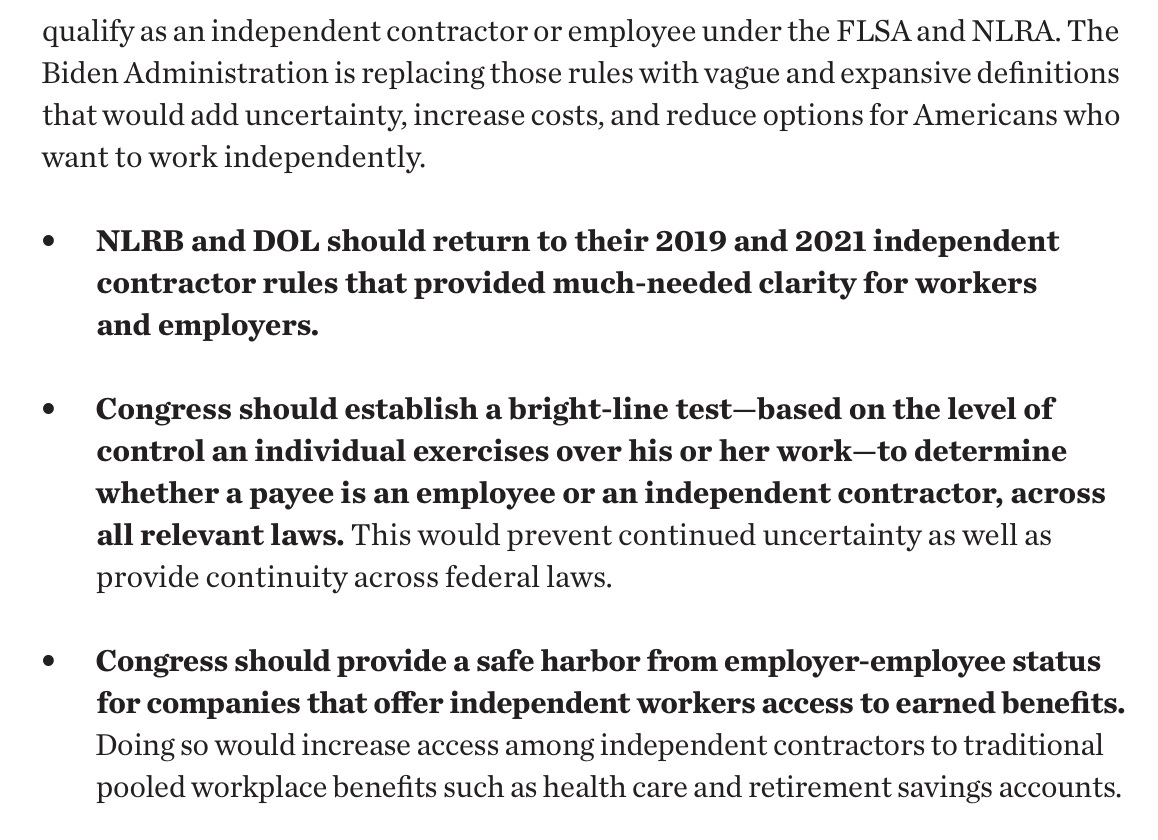Chapter 18
President Trump's nominee for U.S. Labor Department solicitor wrote the Project 2025 chapter about independent contractors. Here's what it says.
About a week ago, President Trump nominated Jonathan Berry to serve as solicitor at the U.S. Department of Labor. Just about everywhere the news was covered, the nomination was mentioned alongside a reference to Project 2025.
That’s because Berry wrote Chapter 18 of Project 2025, about proposed changes involving the Labor Department—including proposed changes to independent-contractor policy.
Berry has to go through the confirmation process in the U.S. Senate before he will be able to assume the role of the Labor Department’s chief legal officer. Certainly, questions will be asked on Capitol Hill about the policies proposed in this chapter of Project 2025.
So, let’s take a look at pages 590 and 591, in particular. Those are the pages within Chapter 18 of Project 2025 that focus on independent-contractor policy.
Pages 590 and 591
This section of Chapter 18 is short and sweet. In a nutshell, it boils down to a single sentence that Berry wrote right at the top: “Protect flexible work options and worker independence (independent contractors).”
Here is this two-page section in its entirety. The beginning provides insight into Berry’s thinking, and the end has three specific policy recommendations:
Taking those three recommendations point by point, Berry is laying out a plan to continue what the U.S. Labor Department started during President Trump’s first term. Back then, under Labor Secretary Eugene Scalia, the department tried to protect independent contractors nationwide from the kind of freelance busting that emerged under California’s Assembly Bill 5.
Scalia wrote at the time, in January 2021:
“[I]n the last few years, liberal activists and politicians have tried to drastically curtail the recognition of independent contractors.
“At the forefront of that effort was AB-5, a California law enacted in 2019. The law required businesses to change the way they classify many of their work relationships, tilting the tables steeply towards identifying workers as employees rather than independent contractors.
“It generated a sharp backlash, from businesses that provide opportunities through the independent contractor model, like ride-share companies, and from workers who had shaped their lives around being in business for themselves.”
Today, more than four years after Scalia wrote those words, the senseless loss of incomes and careers that AB5 inflicted on legitimate independent contractors in California has been well documented.
So has the deep public outrage that has resulted when similar freelance busting has been attempted elsewhere.
And, promises that proponents of AB5 made about how it would help to grow unions have also been thoroughly debunked.
It also remains undeniable that the Democratic Party still intends to spread California’s regulatory language nationwide. This plan was evidenced most recently in the reintroduction of the Protecting the Right to Organize Act with strong Democratic Party support, and during a hearing on Capitol Hill at the end of March.
What Berry wrote in Project 2025—and what Republicans in Congress have already set in motion—is a plan to try and stop that freelance busting at the federal level.
Put simply, the path that Berry outlines in Project 2025 is a way to protect everyone’s freedom to choose self-employment.
The 3 Recommendations
Berry’s first recommendation, that the National Labor Relations Board and the U.S. Labor Department should return to previous rules for independent contractors, follows numerous lawsuits being filed against the Biden-Harris administration over its independent-contractor rule-making. I’m a plaintiff in one of those lawsuits, represented pro bono by Pacific Legal Foundation.
Our attorneys wrote:
“The Trump administration’s DOL simplified and clarified worker classifications with a rule that put the focus on two criteria: the worker’s degree of control and the worker’s ability to make a profit. But now, the Biden administration has upended that straightforward rule and replaced it with an interpretation so vague and uncertain that only the DOL itself can tell if an independent contracting relationship exists. It has made this change with a wholly inadequate justification, leaving millions of contractors twisting in the wind.”
Berry’s second recommendation, that Congress should establish a bright-line test to determine independent contractor status based on the worker’s degree of control, is intended to curtail what one congressional witness late last month described as the “madness” of dueling regulations.
Congressman Kevin Kiley, R-Calif., recently introduced legislation so Congress can do precisely that. The Modern Worker Empowerment Act, or H.R. 1319, would “amend the Fair Labor Standards Act of 1938 and the National Labor Relations Act to clarify the standard for determining whether an individual is an employee, and for other purposes.”
Berry’s third recommendation, to create a “safe harbor” for companies that give independent contractors access to benefits, is an attempt to ensure that self-employed Americans can access more options for benefits without companies being accused of treating them as misclassified employees. In news stories, this plan is often referred to as “portable benefits.”
Kiley recently introduced the Modern Worker Security Act, or H.R. 1320, so Congress can do this as well.
In his press release announcing the Modern Worker Empowerment Act and the Modern Worker Security Act, Kiley made clear how this progression of events continues to try and stop the spread of what happened in California with AB5:
“California’s disastrous AB 5 law wreaked havoc on independent workers, stripping them of their ability to work on their own terms and forcing businesses to cut off contractor relationships. Shifting federal regulations threaten to impose similar uncertainty nationwide, putting millions of workers at risk. By codifying both these protections into law, we prevent future administrations from undermining independent workers and provide businesses with the confidence to fully engage with a modern, flexible workforce.”
That’s it. That’s the whole Project 2025 section about independent contractors that Berry wrote, along with the actions Republicans are currently taking on Capitol Hill in relation to it.
We’re talking about two pages of text that are intended to protect everyone’s freedom to be our own bosses—at a time when 62% of Americans say that’s what we’d prefer to be, and at a time when 80% of independent contractors say we prefer to earn income this way.
As the U.S. Senate prepares for Berry’s confirmation hearing, I sincerely hope the true nature of his three-point plan will be discussed, along with a description of the awfulness that happened in California, and how it led to such policy recommendations being necessary in the first place.
When it comes to independent-contractor policy, Americans do not need to hear fearmongering about Project 2025. Instead, everyone needs to understand why protections against California-style freelance busting are so desperately needed all across the country right now.






